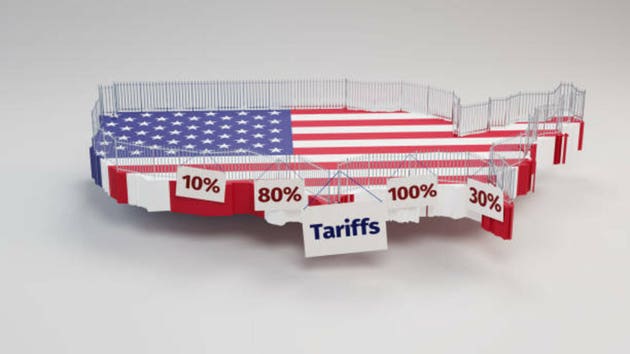Business
Federal Reserve Study Links Tariffs to Lower Inflation, Higher Unemployment

Research from the Federal Reserve Bank of San Francisco suggests that tariffs may contribute to lower inflation rates, although this benefit comes with the trade-off of increased unemployment. The findings, detailed in a working paper by economists Régis Barnichon and Aayush Singh, challenge conventional views on the economic impacts of tariffs.
The researchers conducted an analysis examining the interplay between tariffs, inflation, and employment levels. They argue that while tariffs can reduce consumer prices in certain areas, their implementation often leads to significant job losses in affected industries. The paper highlights a complex relationship where the immediate effects of tariffs can result in lower prices for consumers, but this is countered by the economic fallout that impacts employment.
Understanding the Findings
Barnichon and Singh’s research posits that tariffs can create a “demand shock” in the economy. This phenomenon occurs when the prices of imported goods rise, prompting a shift in consumer spending towards domestically produced items. While this shift can lead to lower overall inflation, it is not without consequences. The authors point out that the higher prices of imports can lead to decreased spending power for consumers, ultimately affecting job stability.
The paper highlights that the overall impact of tariffs is nuanced. For instance, while inflation may decrease in the short term, sectors heavily reliant on imports could face substantial job cuts. This dynamic could create a situation where inflation rates improve, yet a significant portion of the workforce finds itself without employment.
Policy Implications
These findings have important implications for policymakers considering the implementation of tariffs as a tool for economic management. The choice to impose tariffs can be seen as a double-edged sword—potentially stabilizing inflation but simultaneously risking higher unemployment rates.
The research from the Federal Reserve Bank of San Francisco encourages a more detailed examination of both the short-term and long-term effects of tariff policies. As the global economy continues to navigate challenges, understanding these complex relationships becomes essential for informed decision-making.
In conclusion, while tariffs may offer a mechanism for controlling inflation, the associated rise in unemployment presents a significant challenge. Policymakers must weigh these factors carefully to ensure that economic strategies do not inadvertently harm the very populace they aim to support. The insights from Barnichon and Singh contribute to an ongoing dialogue about the role of tariffs in modern economic policy.
-

 Politics1 week ago
Politics1 week agoSecwepemc First Nation Seeks Aboriginal Title Over Kamloops Area
-

 World4 months ago
World4 months agoScientists Unearth Ancient Antarctic Ice to Unlock Climate Secrets
-

 Entertainment4 months ago
Entertainment4 months agoTrump and McCormick to Announce $70 Billion Energy Investments
-

 Lifestyle4 months ago
Lifestyle4 months agoTransLink Launches Food Truck Program to Boost Revenue in Vancouver
-

 Science4 months ago
Science4 months agoFour Astronauts Return to Earth After International Space Station Mission
-

 Technology3 months ago
Technology3 months agoApple Notes Enhances Functionality with Markdown Support in macOS 26
-

 Top Stories1 month ago
Top Stories1 month agoUrgent Update: Fatal Crash on Highway 99 Claims Life of Pitt Meadows Man
-

 Sports4 months ago
Sports4 months agoSearch Underway for Missing Hunter Amid Hokkaido Bear Emergency
-

 Politics3 months ago
Politics3 months agoUkrainian Tennis Star Elina Svitolina Faces Death Threats Online
-

 Politics4 months ago
Politics4 months agoCarney Engages First Nations Leaders at Development Law Summit
-

 Technology4 months ago
Technology4 months agoFrosthaven Launches Early Access on July 31, 2025
-

 Top Stories3 weeks ago
Top Stories3 weeks agoFamily Remembers Beverley Rowbotham 25 Years After Murder









